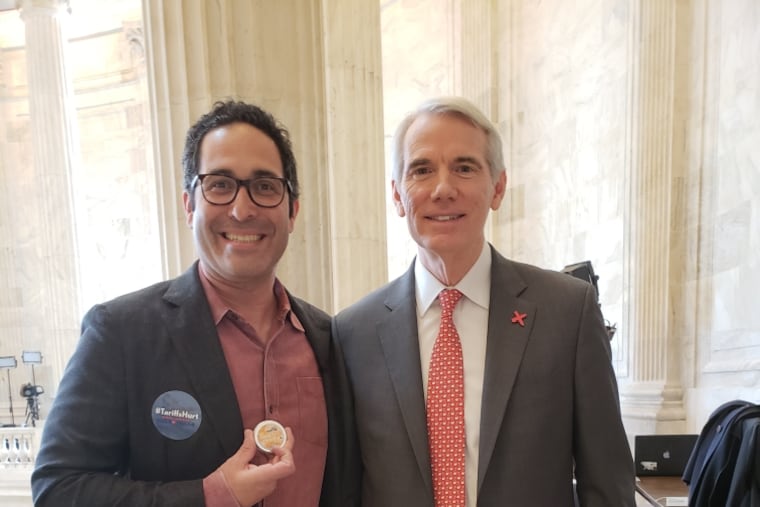Don’t tax toys in the misguided tariff war | Opinion
I’m the inventor of Crazy Aaron’s Thinking Putty. On Feb. 7, I was in Washington, D.C. expressing my concerns to members of Congress about our ongoing tariff war with China.

I’m known as “Crazy Aaron.” I’m the inventor of Crazy Aaron’s Thinking Putty, a mysterious compound that bounces and stretches in fantastical colors and special effects. We are the rare toy company that produces its goods here in the United States and exports them to children around the world. In the 20 years since Crazy Aaron’s began, we have grown from a hobby business (in my parents’ basement) to a mid-size employer with a globally recognized brand operating out of our new world headquarters in Norristown.
On Feb. 7, I was in Washington, expressing my concerns to members of Congress about our ongoing tariff war with China. I know firsthand, as a businessman, that tariffs are extraordinarily counterproductive to trade and commerce.
The first round of tariffs President Donald Trump placed on Chinese goods last August kicked off a long trade battle. For us, the result of Round One has been higher costs for our raw materials. Prices have gone up for both the metal tins used to contain Thinking Putty, and for the silicone that gives our toys their snap. This double hit has had a significant impact on our business and has led to financial loss.
The fact that we source these materials domestically doesn’t seem to matter. The U.S. is part of an intricate global economy, and imposing tariffs on international goods often increases domestic prices by raising demand. With these tariffs in place, U.S. production does not meet U.S. demand. This has sent even more players scrambling for a piece of a fixed domestic supply.
Economists recognize that tariffs are a blunt force instrument. The idea that tariffs will spur increased domestic outputs of materials like steel and silicone only makes sense in theory. Building large-scale industrial plants takes a very long time. And as the economist John Maynard Keynes observed, “This long run is a misleading guide to current affairs. In the long run we’re all dead.” As a practical trade policy tool, tariffs are antiquated.
As destructive as the current rounds of tariffs have been, it is the next round that could deal a fatal blow to America’s approximately $28 billion toy industry. Our company is part of a larger ecosystem of manufacturers, designers, retailers, and toy industry workers. I have serious concerns about our partners who source in China. If further tariffs go into effect, it will mean the almost immediate loss of thousands of jobs and will put a destructive hurricane over the 2019 holiday season.
As a U.S. manufacturer, we are proud of the investment we make in our community. However, we are only able to do so when buoyed by international sales of our product. Growth across world markets is key to our success. Tariffs and trade wars diminish trust and respect for the U.S. abroad and seriously hinder growth in those markets.
I believe the success of U.S. business comes from creativity, ingenuity, and speed in responding to the latest customer demands. Those qualities drive us to produce better products. They also lead consumers overseas to desire American-made products and pay a premium for them. While they may seem like a viable solution to more complicated issues, tariffs are actually self-defeating. They not only diminish our domestic sales from American consumers, who pay what is essentially a tax, but also threaten our export-driven growth.
Let’s be smart and not force a self-inflicted wound by taxing toys and losing what the U.S. toy industry has worked so hard to achieve here and around the world.
Aaron Muderick is the president of Crazy Aaron’s Puttyworld.